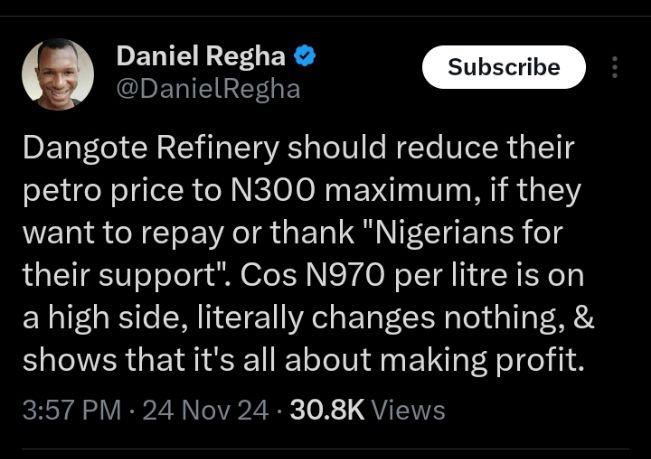Prominent social critic and influencer Daniel Regha has challenged Africa’s richest man, Aliko Dangote, to demonstrate genuine corporate responsibility by drastically reducing fuel prices at his newly operational refinery to N300 per liter.
The contentious call for price reduction comes in the wake of Dangote Refinery’s recent announcement of a marginal decrease in fuel prices to N970 per liter, a move that Regha dismisses as insufficient given the economic challenges facing ordinary Nigerians. Taking to his verified X (formerly Twitter) account on Sunday, the outspoken social commentator articulated his position, suggesting that the current pricing structure fails to acknowledge the years of public support and anticipation that preceded the refinery’s launch.
“Dangote Refinery should reduce their petro price to N300 maximum, if they want to repay or thank Nigerians for their support because N970 per litre is on a high side, literally changes nothing, and shows that it’s all about making profit,” Regha declared in his characteristic forthright manner.
The statement has sparked intense discussion about corporate social responsibility, profit margins, and the delicate balance between business sustainability and public welfare in Nigeria’s volatile petroleum sector. While some observers have dismissed Regha’s proposed price point as unrealistic given current global oil market dynamics, others view his intervention as a necessary push for more affordable fuel prices in a nation where many citizens struggle with the cost of living.
This latest controversy surrounding the Dangote Refinery’s pricing strategy highlights the broader national conversation about fuel costs in Nigeria, a major oil-producing nation where citizens have paradoxically faced persistent challenges with fuel pricing and availability. The recent transition from government-subsidized fuel to market-determined prices has amplified public sensitivity to fuel pricing issues, making Regha’s intervention particularly resonant with many Nigerians.
The timing of Regha’s statement is significant, coming at a moment when many Nigerians are still adjusting to the economic implications of fuel subsidy removal. The Dangote Refinery, as the nation’s first private refinery of its scale, has been viewed by many as a potential solution to Nigeria’s long-standing fuel supply challenges. However, the current pricing structure has led some to question whether the facility will deliver on its promise of more affordable fuel for the average Nigerian.
Critics of Regha’s position argue that his suggested price point fails to consider the complex economic factors that influence fuel pricing, including production costs, market forces, and the need for sustainable business operations. Supporters, however, commend his advocacy for more affordable fuel prices, viewing it as a necessary push for corporate entities to balance profit motives with social responsibility.
The discourse surrounding Regha’s statement reflects a broader debate about the role of private enterprise in addressing public needs, particularly in sectors as crucial as energy. As Nigeria continues its transition toward a more market-oriented fuel pricing system, the tension between business interests and public welfare remains a critical point of discussion.
The Dangote Refinery’s response to this public discourse could set important precedents for how major private sector players engage with public concerns about pricing and accessibility of essential commodities. While the facility’s current price reduction to N970 per liter represents a step toward more competitive pricing, Regha’s intervention suggests that public expectations for price reductions remain significantly higher.
As this debate unfolds, it underscores the complex relationship between private enterprise and public interest in Nigeria’s evolving economic landscape. Whether Regha’s bold call for a N300 price point will influence future pricing decisions at the Dangote Refinery remains to be seen, but his intervention has certainly amplified the ongoing national conversation about fuel pricing and corporate responsibility in Nigeria’s oil sector.



